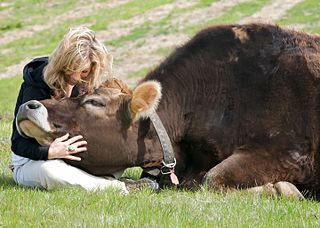A Quote by Peter Singer
The belief that the animals exist because God created them - and that he created them so we can better meet our needs - is contrary to our scientific understanding of evolution and, of course, to the fossil record, which shows the existence of non-human primates and other animals millions of years before there were any human beings at all.
Related Quotes
There was an idea that God created man different from other animals, because man was rational and animals had drives and instincts. That idea of a rational man that was specially created went out the window when Darwin showed that we evolved from animal ancestors, that we have instincts, much as do animals, and that our instincts are very important. It was a much more sophisticated, nuanced, and rich view of the human mind.
If zoos are like arks, then rare animals are like passengers on a voyage of the damned, never to find a port that will let them dock or a land in which they can live in peace. The real solution, of course, is to preserve the wild nature that created these animals and has the power to sustain them. But if it is really true that we are inevitably moving towards a world in which mountain gorillas can survive only in zoos, then we must ask whether it is really better for them to live in artificial environments of our design than not to be born at all.
Evolution explains our biological evolution, but human beings are very unique creatures. As the Dobzhansky said, all animals are unique; humans are the uniquest. And that uniqueness of being human, language, art, culture, our dependency on culture for survival, comes from the combination of traditional biological evolution.
God made all the animals in a single day; he could have swept them all away in the flood and re-created them in one day when they were again needed. Therefore it was an odd idea to save specimens of them for eleven months in the ark, whilst aware that eight persons could not feed or water them by any human possibility. If they were to be preserved by miracle, the ark was not necessary - to let them swim would have answered the purpose and been more indubitably miraculous.
We must embrace our differences, even celebrate our diversity. We must glory in the fact that God created each of us as unique human beings. God created us different, but God did not create us for separation. God created us different that we might recognize our need for one another. We must reverence our uniqueness, reverence everything that makes us what we are: our language, our culture, our religious tradition.
With the eventual acceptance of Darwin's theory we reach a modern understanding of nature, one which has since then changed in detail rather than in fundamentals. Only those who prefer religious faith to beliefs based on reasoning and evidence can still maintain that the human species is the special darling of the entire universe, or that other animals were created to provide us with food, or that we have divine authority over them, and divine permission to kill them.
What distinguished man from animals was the human capacity for symbolic thought, the capacity which was inseparable from the development of language in which words were not mere signals, but signifiers of something other than themselves. Yet the first symbols were animals. What distinguished men from animals was born of their relationship with them.
The problem of reconciling human suffering with the existence of a God who loves, is only insoluble so long as we attach a trivial meaning to the word "love", and look on things as if man were the centre of them. Man is not the centre. God does not exist for the sake of man. Man does not exist for his own sake. "Thou hast created all things, and for thy pleasure they are and were created." We were made not primarily that we may love God (though we were made for that too) but that God may love us, that we may become objects in which the divine love may rest "well pleased".
99% of our uses of animals, including our numerically most significant use of them for food, do not involve any sort of necessity or any real conflict between human and nonhuman interests. If animals matter morally at all, then, even without accepting a theory of animal rights, those uses of animals cannot be morally justified.
Humans — who enslave, castrate, experiment on, and fillet other animals — have had an understandable penchant for pretending animals do not feel pain. A sharp distinction between humans and 'animals' is essential if we are to bend them to our will, make them work for us, wear them, eat them — without any disquieting tinges of guilt or regret. It is unseemly of us, who often behave so unfeelingly toward other animals, to contend that only humans can suffer. The behavior of other animals renders such pretensions specious. They are just too much like us.
The intelligence displayed by many dumb animals approaches so closely to human intelligence that it is a mystery. The animals see and hear and love and fear and suffer. They use their organs far more faithfully than many human beings use theirs. They manifest sympathy and tenderness toward their companions in suffering. Many animals show an affection for those who have charge of them, far superior to the affection shown by some of the human race. They form attachments for man which are not broken without great suffering to them.
The vegan believes that if we are to be true emancipators of animals we must renounce absolutely our traditional and conceited attitude that we have the right to use them to serve our needs. We must supply these needs by other means.... If the vegan ideal of non-exploitation were generally adopted, it would be the greatest peaceful revolution ever known, abolishing vast industries and establishing new ones in the better interests of men and animals alike.
The characteristic human trait is not awareness but conformity, and the characteristic result is religious warfare. Other animals fight for territory or food; but, uniquely in the animal kingdom, human beings fight for their 'beliefs.' The reason is that beliefs guide behavior, which has evolutionary importance among human beings. But at a time when our behavior may well lead us to extinction, I see no reason to assume we have any awareness at all. We are stubborn, self-destructive conformists. Any other view of our species is just a self-congratulatory delusion.
It is not how we breed, keep and kill animals for human consumption that has been the impetus for vegetarianism for thousands of years. It is that we breed, keep and kill animals for human consumption. Throughout the centuries the common thread in the arguments against eating animals is the fact that since we have no nutritional requirement for the flesh or fluids of animals, killing them to simply satisfy our taste-buds or habits or customs amounts to senseless slaughter, and senseless slaughter is no small thing.






































